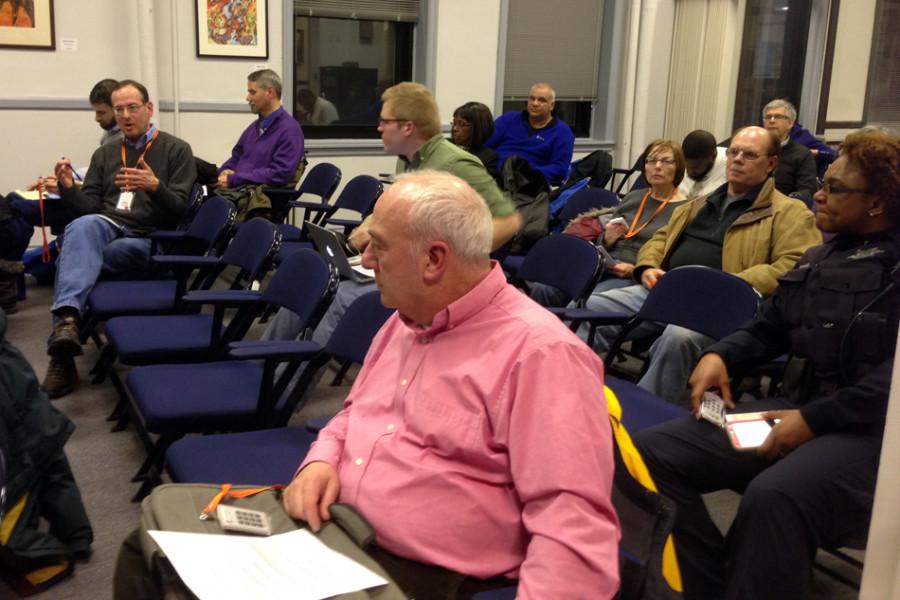Evanston residents weigh in on Divvy bike share program
Julia Jacobs/The Daily Northwestern
Community members discuss potential station sites for the Divvy bike share program. Input from Evanston residents at the Tuesday meeting and through an online survey will help organizers determine locations for eight bike stations coming to the city this summer.
January 13, 2015
Community members weighed in on potential sites for Divvy, a bike-sharing program that is coming to Evanston, during a meeting on Tuesday.
About 20 people attended the meeting at the Civic Center, where they were surveyed on 17 possible bike stations mapped out across the city. Eight specific locations will be chosen in April or May after input from the City Council and more community members, and the stations will be installed in the summer, said Ylda Capriccioso, assistant to the city manager and bike programs coordinator.
An online survey will be launched Wednesday to get feedback from a larger group of community members, Capriccioso said.
“Nothing is set in stone,”said Damir Latinovic, the city’s neighborhood and land use planner. “These are just suggestions, and this is why we need your feedback. It can change, it likely will change, but it will also give us an idea how to move forward.”
Evanston, with Chicago and Oak Park, received a $3 million grant from former Gov. Pat Quinn in September to expand the program by 70 stations in the region. Evanston will receive $80,000 of the grant to fund equipment installation for its share of new stations, said Catherine Hurley, the city’s sustainable programs coordinator.
Bikers can purchase a $75 annual membership or a 24-hour pass for $7. Both options allow for unlimited 30 minute trips.
At least two of the 17 possible stations, at the intersection of Chicago Avenue and Sheridan Road and the intersection of Noyes Street and Sheridan Road, were proposed with Northwestern campus use in mind, Latinovic said. Evanston will offer students with WildCARDS $20 off an annual membership in partnership with the University.
Representatives from Chicago’s Divvy program, which currently has 300 stations, spoke to community members about the safety and sustainability of the program, as well as the strategic placement of stations. In Chicago, stations are positioned no more than four blocks from each other for optimal use as a transit system, said Sean Wiedel, assistant commissioner at the Chicago Department of Transportation.
The 17 potential station sites were determined by overlaying multiple data points analyzed by a group of NU engineering students, taking into consideration housing, employment, destinations and visibility, Hurley said. Organizers then added more east and west locations to establish a more balanced distribution.
“Evanston’s only eight square miles, and you can get pretty far across town in the 30-minute time limit,” Hurley said. “There’s actually the ability to connect a large part of Evanston with the stations that we have.”
Officials had to balance the issue of distance between stations with population, density and likelihood that the bikes will be put to good use, Latinovic said.
Evanston resident Nicholas Ridder said he thought that the distribution of the 17 potential sites underserved west Evanston. However, other residents thought the stations seemed too spread out, potentially diluting the impact of the program as a transit system.
“You’ve got to initially use transportation hubs to be your base, whether folks are starting there or ending there,” Evanston resident Yvette Granberry said. “I think it’s a good first shot.”
Email: [email protected]
Twitter: @juliarebeccaj


